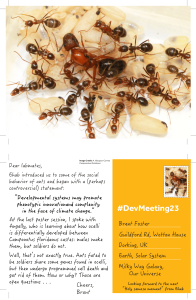9 January 2024
Development’s Journal Meeting, Unconventional and Emerging Experimental Organisms in Cell and Developmental Biology, took place from 17 to 20 September 2023 at the beautiful Wotton House in Surrey, UK.
In the opening remarks of the Meeting, Katherine Brown, the Executive Editor of Development, made the case for the developmental biology field to expand their horizons. Traditional models like flies, mice, and fish, while invaluable, are not the be-all and end-all of developmental biology. The need for diversity in the study of life’s fundamental processes has become strikingly clear in recent years.
Brent Foster, one of the Node correspondents, attended the Meeting and had an ‘unconventional idea’ of his own on the Node celebrating the unconventional experimental systems presented at the Meeting. Each day he uploaded digitally drawn postcards spotlighting the breadth of unconventional systems shared in talks and poster presentations. Have a browse through all of Brent’s digital postcards.

Brent, who works with non-model marine invertebrates at the Whitney Laboratory, University of Florida, also wrote a full report of the Meeting. In the report, Brent summarised three opportunities that emerged from the Meeting for the developmental biology community:
- the need to broaden the field’s taxonomic sampling
- the importance of educating the field about challenges inherent with unconventional systems
- the need to expand our vision to include the impacts of climate change
The Meeting drew researchers from an astonishingly wide range of species including single-celled choanoflagellates, cnidarians, honeydews, eusocial insects, mollusks and geckos. This diversity wasn’t just a nod to biodiversity but a fundamental requirement. As Brent highlighted, unconventional organisms hold the keys to unravelling the complex biological mechanisms behind development.
“They challenge our existing knowledge and expand the possibilities of what we can learn.”
Brent Foster
However, the Meeting underscored a critical challenge in the world of unconventional systems: the struggle to gain recognition and publish their work. Researchers in this field often faced difficulty in convincing their peers, accustomed to traditional model organisms, of the value of their work. The lack of resources and the abundance of unknowns could be daunting.
Brent highlighted the need to educate the field about these inherent challenges and the importance of setting realistic expectations for reviewers. It was not reasonable to expect unconventional systems to meet the same standards as traditional models. Instead, the emphasis should be on assessing whether the data supported the author’s conclusions and whether those conclusions aligned with the journal scope.
To extend the discussions beyond the lab bench, the Meeting included a one-hour panel session asking the question: what can developmental biologists contribute to the global challenges of climate change and biodiversity loss? The answer, as Brent and all the participants discovered, was not straightforward.
Four panellists, each with expertise in different organisms, emphasised the need for a multidisciplinary approach. Ehab Abouheif, a researcher from McGill University, argued that working with unconventional systems and engaging with fields outside evolutionary and developmental biology required becoming a “jack of all trades but the master of none.” There was no single solution to this complex issue, and scientists from various backgrounds needed to collaborate. The fields of developmental biology and climate research may seem distinct, but the discussion brought out a few concrete examples of cross-over. For those interested in learning more, the full panel session can be accessed on the Node.
As the Development Meeting concluded, Brent left with a profound sense of the transformative potential of using unconventional organisms in developmental biology. The Meeting served as a reminder that the expansion of taxonomic sampling, the intersection with climate change, and the education of the scientific community are integral steps towards a more comprehensive understanding of the developmental processes across all species. Visit the Node to read Brent’s full Meeting Report.
The next Development Meeting ‘From stem cells to human development’ will be held from 16 to 19 September 2024. Find out more and register your interest.








You must be logged in to post a comment.